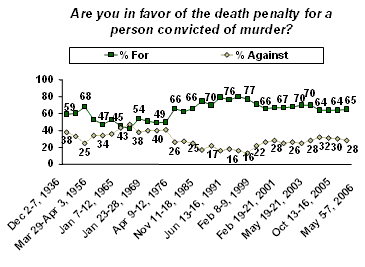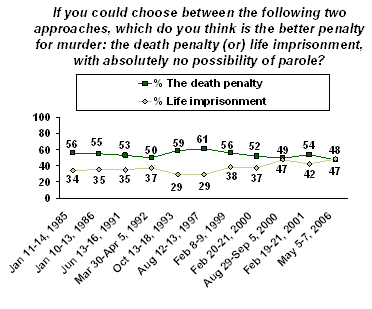GALLUP NEWS SERVICE
PRINCETON, NJ -- July 2nd marks the 30th anniversary of the landmark Supreme Court decision Gregg v. Georgia, which effectively reinstated the death penalty in the United States. Four years earlier, the 1972 Furman v. Georgia decision struck down most state statutes on the death penalty, formalizing what had been a practical moratorium on executions in the country since 1968. A review of historical Gallup poll data shows that those developments had a noticeable impact on Americans' support for the death penalty. Today, roughly two in three Americans say they favor the death penalty for convicted murderers.
Basic Support for the Death Penalty
One of Gallup's longest standing trend questions measures basic support for the death penalty. In 1936, Gallup first asked Americans the following: "Are you in favor of the death penalty for murder?" In that poll, 59% of Americans were in favor of and 38% opposed the death penalty. Gallup has updated that or similarly worded questions 35 times since 1936 and support has varied over time. However, more Americans have favored than opposed the death penalty for convicted murderers in all but one poll.

In the 1930s, approximately 60% of Americans said they supported the "death penalty" or "capital punishment" in response to several different wordings of the question. Beginning in 1953, Gallup standardized the question wording to read, "Are you in favor of the death penalty for a person convicted of murder?" At that time, 68% of the public indicated they were in favor of the death penalty.
Throughout the late 1950s and into the 1970s, Americans' support for the death penalty declined. The percentage of Americans in favor of the death penalty ranged from 42% to 54% during this period. The year 1966 marked the only time more Americans said they were against the death penalty (47%) than said they were for it (42%). There was much discussion about the constitutionality of the death penalty during this time, in part focusing on whether it violated the Eighth Amendment prohibition on cruel and unusual punishment, not to mention a long list of problems in its application to specific cases. In part because of these concerns, no executions took place in America between 1968 and 1977.
During that time, the Furman v. Georgia (1972) decision held that sentencing in death sentences could be "cruel and unusual" if they were found to be arbitrary, too severe for the crime, or not more effective than a less severe penalty. However, the ruling stopped short of declaring the death penalty unconstitutional; rather, it voided existing death penalty statutes if they could lead to arbitrary sentencing.
In response to the Furman decision, many states crafted new death penalty laws which included sentencing guidelines and other reforms. In 1976, the new Georgia law was put to the test in the Supreme Court in the Gregg case. The Court ruled that the death penalty was in fact constitutional under the Eighth Amendment.
Public support for the death penalty began to increase in 1976. A May poll conducted shortly before the Gregg decision was released found 66% of Americans in favor of the death penalty, the highest since 1953. On January 17, 1977, Gary Gilmore was executed in Utah, marking the first execution in the country since 1968. Support for the death penalty remained in the mid-60s for the duration of the 1970s.
As the use of the death penalty increased in the 1980s, public support for it grew, pushing past 70% in 1985 and reaching a high of 80% support in 1994. Support has declined since then, and has remained at about the two-thirds level for the better part of this decade.
Gallup finds lower support for the death penalty when respondents are asked whether it or life imprisonment is the better punishment for murder. In May, 48% favored life imprisonment and 47% the death penalty. Support for the death penalty on this measure has usually exceeded 50%, but been substantially lower than on the historical Gallup question.

Americans and the Death Penalty Controversy
Americans are aware of some of the problems associated with the death penalty. Previous polling has shown that most Americans (63% in a May 2006 poll) believe that innocent people have been executed under the death penalty. Also, only 34% believe it acts as a deterrent to murder, as its proponents claim. That view has shifted over time -- Gallup polls from 1985-1991 found that most Americans believed the death penalty did deter criminals from committing murder.
Despite these concerns, Gallup polls have shown that most Americans believe that the death penalty is applied fairly in this country, and roughly half think it is not applied enough (the remainder of Americans break about evenly between those who think it is applied too often and those who think it is applied the right amount of time).
Gallup has found, through the use of open-ended questions, that most death penalty supporters do so because of the notion that it provides revenge or equal justice. These emotional, or perhaps philosophical, considerations are more often given as reasons for supporting the death penalty than practical ones such as saving taxpayer money or preventing additional crime.
Why do you favor the death penalty for persons convicted of murder? [Open-ended; mulitple responses allowed]
BASED ON THOSE WHO FAVOR THE DEATH PENALTY FOR PERSONS CONVICTED OF MURDER
|
May |
Feb |
Feb |
|
|
% |
% |
% |
|
|
An eye for an eye/They took a life/Fits the crime |
37 |
48 |
40 |
|
They deserve it |
13 |
6 |
5 |
|
Save taxpayers money/Cost associated with prison |
11 |
20 |
12 |
|
Deterrent for potential crimes/Set an example |
11 |
10 |
8 |
|
They will repeat crime/Keep them from repeating it |
7 |
6 |
4 |
|
Biblical reasons |
5 |
3 |
3 |
|
Depends on the type of crime they commit |
4 |
6 |
6 |
|
Serve justice |
4 |
1 |
3 |
|
Fair punishment |
3 |
1 |
6 |
|
If there's no doubt the person committed the crime |
3 |
2 |
-- |
|
Would help/benefit families of victims |
2 |
1 |
-- |
|
Support/believe in death penalty |
2 |
6 |
-- |
|
Don't believe they can be rehabilitated |
2 |
2 |
1 |
|
Life sentences don't always mean life in prison |
1 |
2 |
-- |
|
Relieves prison overcrowding |
1 |
2 |
-- |
|
|
|
|
|
|
Other |
4 |
3 |
10 |
|
No opinion |
2 |
1 |
3 |
On the other hand, opponents generally believe it is wrong to take any life. A substantial and growing percentage of opponents express concerns about executing innocent people.
Why do you oppose the death penalty for persons convicted of murder? [Open-ended; multiple responses allowed]
BASED ON THOSE WHO OPPOSE THE DEATH PENALTY FOR PERSONS CONVICTED OF MURDER
|
May |
Jun. |
|
|
% |
% |
|
|
Wrong to take a life |
46 |
41 |
|
Persons may be wrongly convicted |
25 |
11 |
|
Punishment should be left to God/religious belief |
13 |
17 |
|
Need to pay/suffer longer/think about their crime |
5 |
-- |
|
Possibility of rehabilitation |
5 |
6 |
|
Depends on the circumstances |
4 |
-- |
|
Unfair application of death penalty |
4 |
6 |
|
Does not deter people from committing murder |
4 |
7 |
|
|
|
|
|
Other |
3 |
16 |
|
No opinion |
4 |
6 |
Survey Methods
These results are based on telephone interviews with randomly selected national samples of approximately 1,000 adults, aged 18 and older. For results based on these samples, one can say with 95% confidence that the maximum error attributable to sampling and other random effects is ±3 percentage points. In addition to sampling error, question wording and practical difficulties in conducting surveys can introduce error or bias into the findings of public opinion polls.
Are you in favor of the death penalty for a person convicted of murder?
|
For |
Against |
No opinion |
|
|
% |
% |
% |
|
|
|
|
|
|
|
2006 May 5-7 ^ |
65 |
28 |
7 |
|
|
|
|
|
|
2005 Oct 13-16 |
64 |
30 |
6 |
|
2004 Oct 11-14 |
64 |
31 |
5 |
|
2003 Oct 6-8 |
64 |
32 |
4 |
|
2003 May 19-21 |
70 |
28 |
2 |
|
2002 Oct 14-17 |
70 |
25 |
5 |
|
2001 Oct 11-14 |
68 |
26 |
6 |
|
2001 Feb 19-21 ^ |
67 |
25 |
8 |
|
2000 Aug 29-Sep 5 |
67 |
28 |
5 |
|
2000 Jun 23-25 |
66 |
26 |
8 |
|
2000 Feb 14-15 |
66 |
28 |
6 |
|
1999 Feb 8-9 |
71 |
22 |
7 |
|
1995 May 11-14 |
77 |
13 |
10 |
|
1994 Sep 6-7 |
80 |
16 |
4 |
|
1991 Jun 13-16 |
76 |
18 |
6 |
|
1988 Sep 25-Oct 1 |
79 |
16 |
5 |
|
1988 Sep 9-11 |
79 |
16 |
5 |
|
1986 Jan 10-13 |
70 |
22 |
8 |
|
1985 Jan 11-14 |
72 |
20 |
8 |
|
1985 Nov 11-18 |
75 |
17 |
8 |
|
1981 Jan 30-Feb 2 |
66 |
25 |
9 |
|
1978 Mar 3-6 |
62 |
27 |
11 |
|
1976 Apr 9-12 |
66 |
26 |
8 |
|
1972 Nov 10-13 |
57 |
32 |
11 |
|
1972 Mar 3-5 |
50 |
41 |
9 |
|
1971 Oct 29-Nov 2 |
49 |
40 |
11 |
|
1969 Jan 23-28 |
51 |
40 |
9 |
|
1967 Jun 2-7 |
54 |
38 |
8 |
|
1966 May 19-24 |
42 |
47 |
11 |
|
1965 Jan 7-12 |
45 |
43 |
12 |
|
1960 Mar 2-7 |
53 |
36 |
11 |
|
1957 Aug 29-Sep 4 |
47 |
34 |
18 |
|
1956 Mar 29-Apr 3 |
53 |
34 |
13 |
|
1953 Nov 1-5 |
68 |
25 |
7 |
|
1937 Dec 1-6 |
60 |
33 |
7 |
|
1936 Dec 2-7 |
59 |
38 |
3 |
|
|
|
|
|
|
^ Asked of a half sample |
|||
If you could choose between the following two approaches, which do you think is the better penalty for murder -- [ROTATED: the death penalty (or) life imprisonment, with absolutely no possibility of parole]?
|
The death |
Life |
No |
|
|
% |
% |
% |
|
|
2006 May 5-7 ^ |
47 |
48 |
5 |
|
2001 Feb 19-21 ^ |
54 |
42 |
4 |
|
2000 Aug 29-Sep 5 ^ |
49 |
47 |
4 |
|
2000 Feb 20-21 |
52 |
37 |
11 |
|
1999 Feb 8-9 ^ |
56 |
38 |
6 |
|
1997 Aug 12-13 ^ |
61 |
29 |
10 |
|
1993 Oct 13-18 |
59 |
29 |
12 |
|
1992 Mar 30-Apr 5 |
50 |
37 |
13 |
|
1991 Jun 13-16 |
53 |
35 |
11 |
|
1986 Jan 10-13 |
55 |
35 |
10 |
|
1985 Jan 11-14 |
56 |
34 |
10 |
|
|
|
|
|
|
^ Asked of a half sample |
|||
Generally speaking, do you believe the death penalty is applied fairly or unfairly in this country today?
|
Fairly |
Unfairly |
No opinion |
|
|
% |
% |
% |
|
|
2006 May 8-11 ^ |
60 |
35 |
4 |
|
|
|
|
|
|
2005 May 2-5 |
61 |
35 |
4 |
|
2004 May 2-4 |
55 |
39 |
6 |
|
2003 May 5-7 |
60 |
37 |
3 |
|
2002 May 6-9 |
53 |
40 |
7 |
|
2000 Jun 23-25 |
51 |
41 |
8 |
|
|
|
|
|
|
^ Asked of a half sample |
|||
How often do you think that a person has been executed under the death penalty who was, in fact, innocent of the crime he or she was charged with -- do you think this has happened in the past five years, or not?
|
Yes, happened |
No, has not |
No opinion |
|
|
% |
% |
% |
|
|
2006 May 8-11 |
63 |
27 |
10 |
|
|
|
|
|
|
2005 May 2-5 |
59 |
33 |
8 |
|
2003 May 5-7 |
73 |
22 |
5 |
|
|
|
|
|
|
^ Asked of a half sample |
|||
Do you feel that the death penalty acts as a deterrent to the commitment of murder, that it lowers the murder rate, or not?
|
Yes, does |
No, does not |
No opinion |
|
|
% |
% |
% |
|
|
2006 May 8-11 |
34 |
64 |
2 |
|
|
|
|
|
|
2004 May 2-4 |
35 |
62 |
3 |
|
1991 Jun 13-16 |
51 |
41 |
8 |
|
1986 Jan 10-13 |
61 |
32 |
7 |
|
1985 Jan 11-14 |
62 |
31 |
7 |
|
|
|
|
|
|
^ Asked of a half sample |
|||
